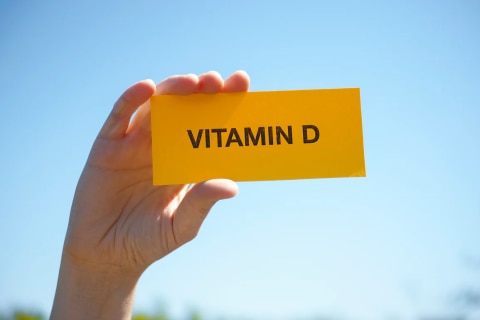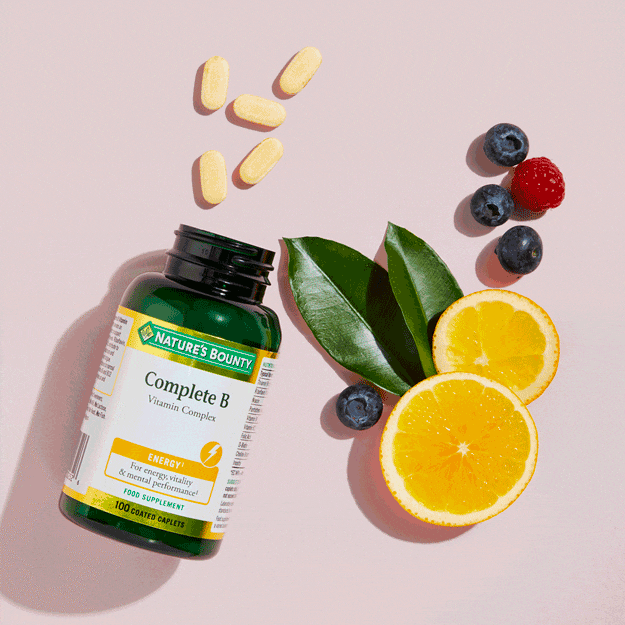
Do you need a multivitamin?
Should you be taking a multivitamin? It’s a question that comes up a lot. It’s important to first remember that a multivitamin cannot replace a healthy, varied, well-balanced diet.
But there may be good reasons to take one if your diet isn’t always up to scratch. In fact, many of us are not achieving the recommended nutrient intakes for a number of vitamins and minerals that are essential for our everyday wellbeing.1
Among the reasons why we may not get enough vitamins and minerals in our diets could be due to empty-calorie foods, eating too many of the wrong foods, and lack of fruit and vegetable intake.2-3 High levels of stress can also increase our need for certain nutrients.4 Additionally, restrictive diets such as veganism or low-carb diets, plus lack of appetite with age can contribute to not getting enough nutrition from our diets.
Multivitamins contain a range of nutrients that can help support various aspects of our health.
Our cells produce energy via a complex process that metabolises carbohydrates, fat and protein. Multivitamins contain a wide array of nutrients that can help ensure that this process takes place efficiently. B vitamins and magnesium stand out from the crowd in this regard in their ability to help ward off tiredness and fatigue,
We all want to be at our best both physically and mentally. Our brains use 20% of our body’s energy. A large proportion of this is utilised to help neurons fire and send signals whilst the rest is used to help keep brain tissue alive.5 Vitamins such as pantothenic acid (vitamin B5) contribute to our mental performance and minerals like iodine and magnesium support our cognitive, psychological and nervous system function.
Almost all of us are spending more time in front of screens and that can have a negative effect on our vision. Vitamin A, vitamin B2 and zinc can all help support the overall health of our eyes.
The best diet to support the immune system is one rich in micronutrients. Vegetables, fruits, berries, nuts, seeds, grains and pulses along with some meats, eggs, dairy products and oily fish are good sources of vitamin C, D and zinc—the fundamentals for immune function.6 However, if you are not getting enough of these foods in your daily diet a multivitamin can help cover your bases.
Vitamin D, however, is only found in the diet in small quantities in foods such as oily fish, eggs and sun dried mushrooms. The main source is sun exposure in the spring and summer months and large numbers of the UK’s population are deficient in this vital vitamin. This is why the government recommends that everyone considers taking a supplement during the autumn and winter months.7 Choose a multivitamin containing vitamin D3 (cholecalciferol), the more active and bioavailable form of the vitamin.8
Our skin and hair are continually regenerating themselves and their quality is closely linked to our nutritional state.9-12 Hair can grow one centimeter a month for up to six years before falling out so nutritional support is vital for maintaining healthy locks. The mineral copper is particularly important: it contributes to normal hair pigmentation. Vitamin C and zinc are also important due to antioxidant properties contribution to collagen formation.
Remember that multivitamins do not contain fibre or all the phytonutrients that are present in food, so always try to prioritise your diet first! However, if you think you may need to plug some of the gaps in your diet then consider one of our multivitamins. We have a multivitamin with beauty in mind, one that supports eye health as well as a great tasting adult and women’s gummy.
References:
- Derbyshire E. Micronutrient Intakes of British Adults Across Mid-Life: A Secondary Analysis of the UK National Diet and Nutrition Survey. Front Nutr. 2018 Jul 19;5:55.
- Kozlovsky AS et al. Effects of diets high in simple sugars on urinary chromium losses. Metabolism. 1986 Jun;35(6):515-8.
- DiNicolantonio JJ, Berger A. Added sugars drive nutrient and energy deficit in obesity: a new paradigm. Open Heart. 2016;3(2)
- Pickering, G et al. Magnesium Status and Stress: The Vicious Circle Concept Revisited. Nutrients 2020, 12, 3672.
- https://www.scientificamerican.com/article/why-does-the-brain-need-s/
- Calder PC. Nutrition, immunity and COVID-19. BMJ Nutr Prev Health. 2020 May 20;3(1):74-92.
- Vitamin D & Health. Scientific Advisory Committee on Nutrition. 2016 https://assets.publishing.service.gov.uk/government/uploads/system/uploads/attachment_data/file/537616/SACN_Vitamin_D_and_Health_report.pdf
- Heaney RP et al. Vitamin D(3) is more potent than vitamin D(2) in humans. J Clin Endocrinol Metab. 2011 Mar;96(3):E447-52.
- Ralph M Trüeb, MD. Serum Biotin Levels in Women Complaining of Hair Loss. Int J Trichology. 2016 Apr-Jun; 8(2): 73–77.
- Purba MB et al. Skin wrinkling: can food make a difference? J Am Coll Nutr 2001;20:71-80.
- Cosgrove MC et al. Dietary nutrient intakes and skin-aging appearance among middle-aged American women. Am J Clin Nutr 2007;86:1225-1231.
- Boelsma E et al. Human skin condition and its associations with nutrient concentrations in serum and diet. Am J Clin Nutr 2003;77:348-355.
Don't keep all the good info to yourself.
Share this with friends!
Explore more blogs:



